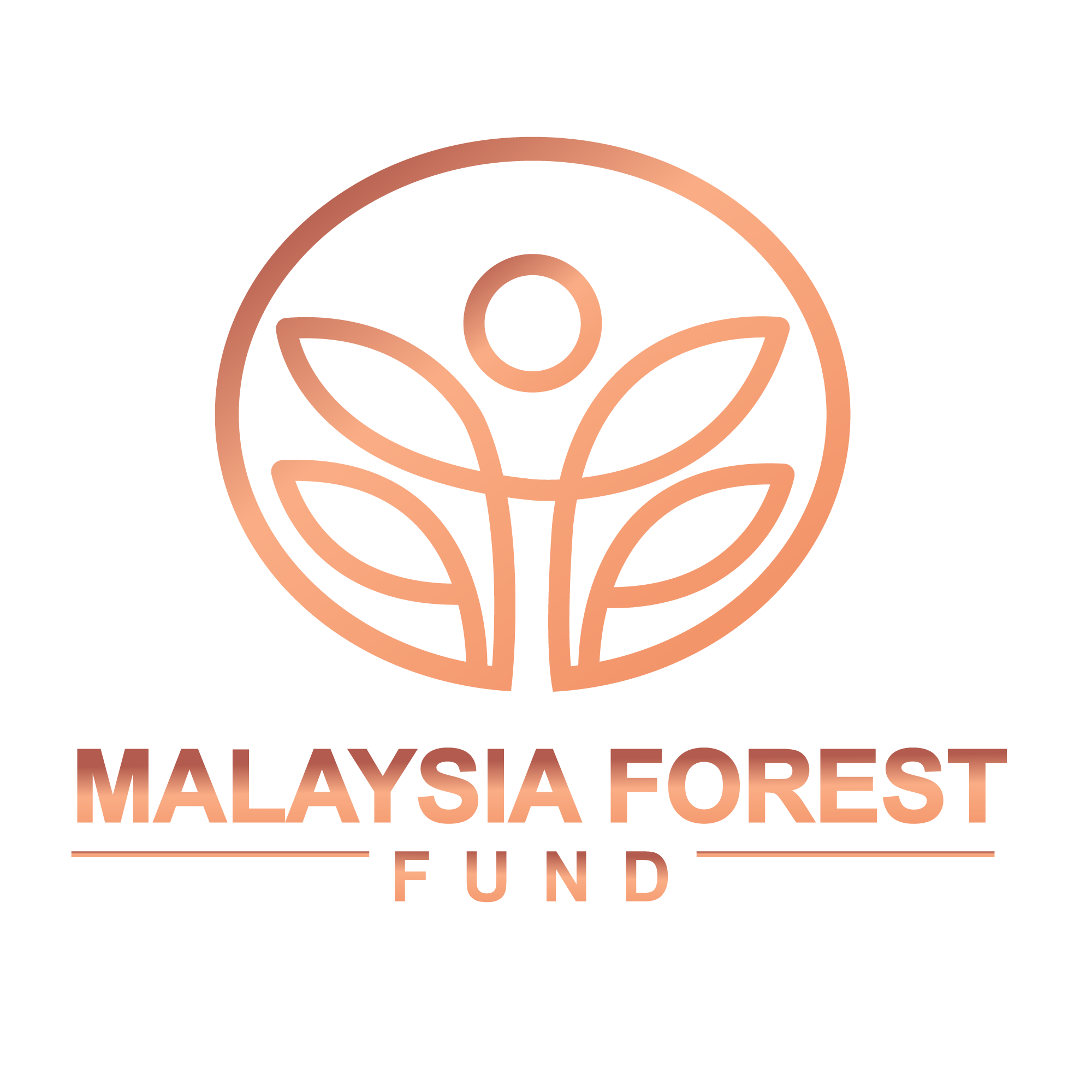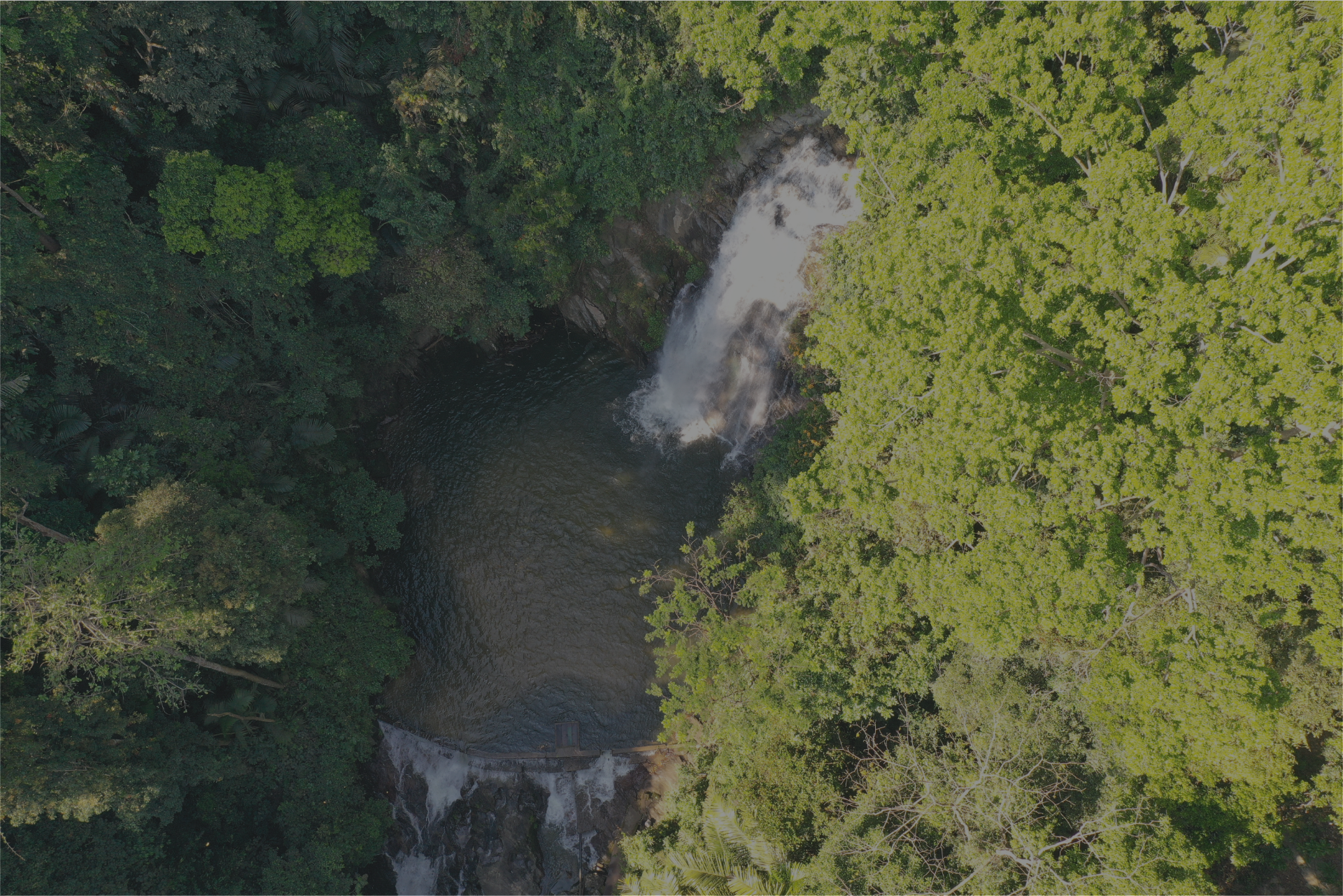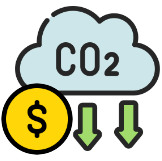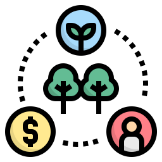Forest Carbon Offset (FCO)
The Forest Carbon Offset (FCO) Protocol will set out the requirements of the Ministry of Natural Resources and Environmental Sustainability quantification, monitoring, and reporting of GHG emissions and removals; demonstration of the implementation of the Cancun Safeguards; and verification, registration, and issuance of FCO credits.
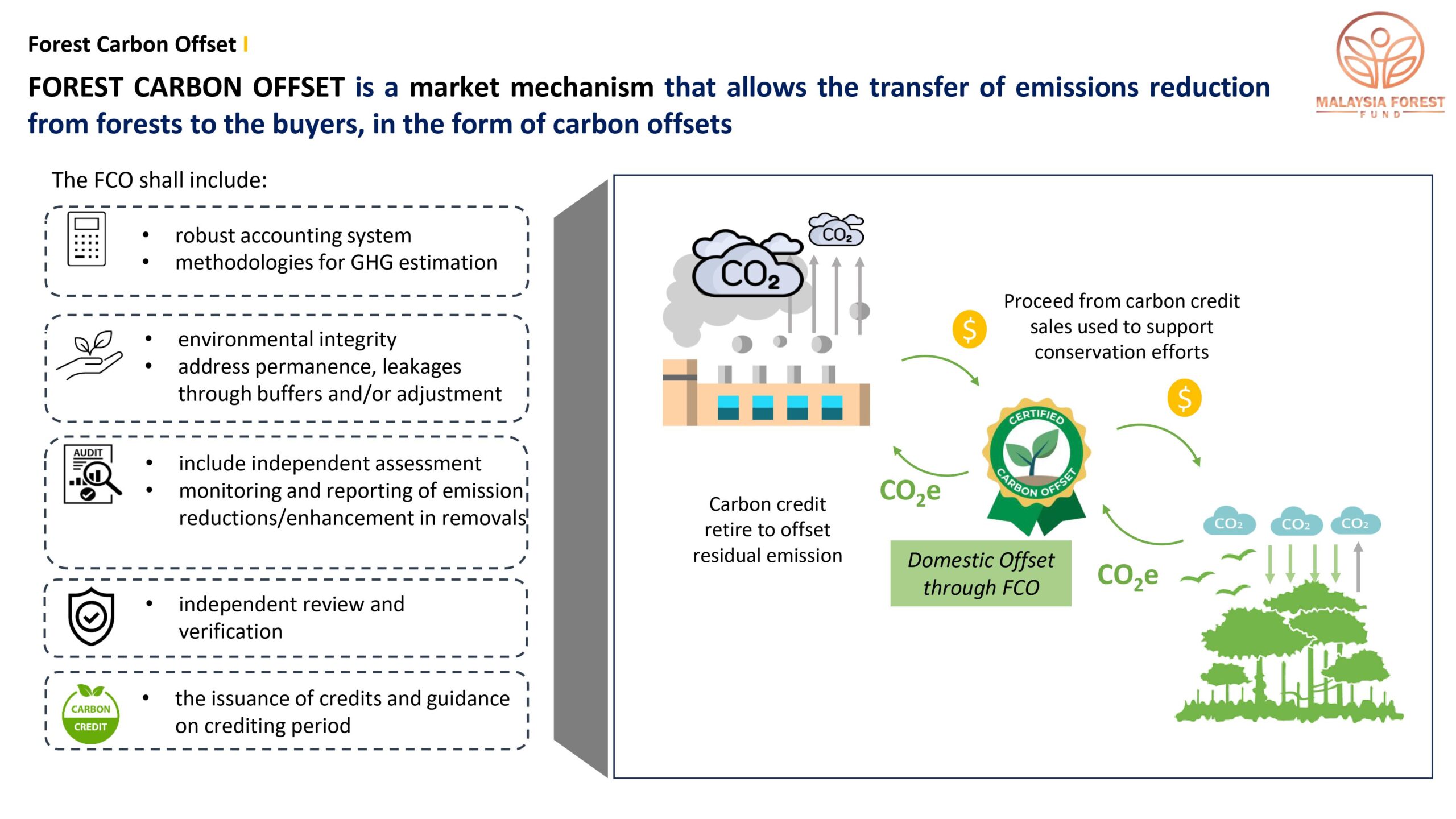
- FCO Features
- Eligible Activities Under FCO
- Who can participate in FCO?
- Benefit of Forest Carbon Offset
All activities supporting conservation and sustainable forest management including those covered under the scope of REDD Plus, as defined by UNFCCC decisions embodied under the Warsaw Framework for REDD Plus as well as the National REDD Plus Strategy under the FCC Protocol.
1. Proponent
- Federal government/ Ministries and related agencies
- State Government and agencies
- Land Owners or entities with a clear legal title to the land or public land
- Non-government or private entities with written approval from the state government allowing them to apply for and hold a certificate under the FCC protocol for conservation activities on the specific area of public land
2. Donor
- Local or international entities* such as companies, businesses, societies or individual (s)
3. Donor & Proponent
- Donor and Proponent shall agree to be listed on the publicly available registry, which is a central repository for all information and documentation relating to REDD Plus Finance Framework
FCC acknowledges the contribution of activities towards generating benefits to the biodiversity, community and climate
Biodiversity Indicator
- Protect and monitor wildlife
- Protect keystone species
- Protect endangered or threatened species.
- Protect endemic species.
- Prevention of poaching & illegal wildlife trade
- Protect water catchment areas
- Combating bio-piracy under the Access to Biology Resources and Benefit Sharing Act 2017 (Act 795)
- Enhancement of livelihoods
- Other biodiversity benefits
Socio-Economic Indicators
- Preservation of traditional livelihoods and culture
- Protection of culturally and/or historically significant sites
- Increase income generation (non-timber forest products/non-deforestation)
- Diversification of employment opportunities and sustainable use of forests
- Long-term community access to forest resources
- Enhanced food security and enhanced access to clean water
- Promote green tourism
- Other socio-economic benefits
Sustainable Development Goals (SDGs) Indicators
SDG 13 – Climate Change
- Strengthen resilience and adaptive capacity to climate related hazards and natural disasters
- Integrate climate change measures into strategies and planning
- Improve education, awareness raising and human and institutional capacity on climate change mitigation, adaptation, impact reduction and early warning.
SDG 15 – Life on Land
- Conserve and restore terrestrial and freshwater ecosystems
- Reduce deforestation and restore degraded forests
- Protect biodiversity and natural habitats
- Eliminate poaching and trafficking of protected species
- Prevent invasive alien species on land and in water ecosystems.
- Increase financial resources to conserve and sustainably use ecosystem and biodiversity
- Finance and incentivize sustainable forest management
- Opportunity to Reverse
- GHGs
- Global Warming
- Technical Working Group for Forest Carbon Offset Guideline
- Subsidiary Guidelines on Forest Carbon Offset Programs
- Forest Carbon Offset Methodologies
Managed forests for carbon sequestration offer an opportunity to reverse or stabilise human and societal emissions from fossil fuels and land use.
Carbon capture in forests can play an important role in mitigating the effects of climate change. In additional, forests provide a variety of ecosystem services to the public, ranging from water quality and population regulation to providing wildlife habitat that protects biodiversity.
The total amount of global greenhouse gases (GHGs) is increasing rapidly; about half of all GHG emissions have occurred in the past 40 years. Current climate models predict increases in global temperatures, sea levels and climate change.
A carbon offset is a reduction or removal of emissions of carbon dioxide or other greenhouse gases made in order to compensate for emissions made elsewhere.
Offsets are measured in tonnes of carbon dioxide-equivalent (CO2e). One ton of carbon offset represents the reduction or removal of one ton of carbon dioxide or its equivalent in other greenhouse gases.
Climate change is causing severe drought and flooding events, and rising sea levels putting drinking water reserves at risk. Evidence suggests that global warming will disproportionately affect local communities that depend on agriculture or coastal livelihoods.
The Forest Carbon Offset (FCO) Protocol will set out the requirements of the ministry of Energy and Environment (KeTSA) quantification, monitoring, and reporting of GHG emissions and removals; demonstration of the implementation of the Cancun Safeguards; and verification, registration, and issuance of FCO credits.
The Ministry of Natural Resources and Environmental Sustainability has concluded the feasibility study of Forest Carbon Offset (FCO) in Malaysia, which is the market-based instrument under the REDD Plus Financial Framework. The study outlined the need to develop a domestic crediting system that meets higher integrity levels and taking into consideration national’s circumstances, particularly pertaining to Federal and State matters.
Malaysia Forest Fund (MFF) is tasked to spearhead this endeavour, and once completed, to operationalize it as Malaysia’s very own carbon standard for nature-based solutions activities. This TWG will serve as a strategic and technical resource to support the initial draft review and continuous development of guidelines on FCO including framing its modalities and technical requirements
TWG Forest Carbon Offset Term Of Reference
Current Members (as of 21 March 2025)
Ministry of Natural Resources and Environmental Sustainability (NRES) – Subestheran A/L Suparmaniam
Ministry of Natural Resources and Urban Development – Tessy Anak Nimos
Forestry Department of Peninsular Malaysia – Iqtie Qamar Laila binti Mohd Gani
Standards and Industrial Research Institute of Malaysia (SIRIM)- Aernida binti Abdul Kadir
Johor State Economic Planning Division – Nurfarahin Zahiridin
Penang State Economic Planning Unit – Muhammad Azri Husaini Mohamad Rodzi
Pahang State Economic Planning Unit – Nadimah Hilwah binti Mohd Saifuddin
Kedah State Economic Planning Unit – Muhammad Zaim bin Haji Jamil
Perlis State Economic Development Corporation – Puteri Nurul Nazuha
Terengganu State Economic Development Corporation – Mohd Al Nazirul Mubin bin Hussein
Kelantan State Economic Planning Unit – Wan Illy Liana binti Wan Mat
Perak State Government Economic Planning Unit – Intan Shafini binti Mustafa
Melaka State Economic Planning Unit/Melaka Greentech (PTHM) – Faiqah Nadhirah binti Faizol
Negeri Sembilan Economic Planning Unit – Munirah Bibi binti Hamsa
Johor State Forestry Department – Mohd Fariz bin Abd Rhani
Pahang State Forestry Department – Line @ Norline binti Zarnudin
Terengganu State Forestry Department – Radhuan bin Ramli
Perak State Forestry Department – Rusli bin Tahir
Penang State Forestry Department – Muhammad Ezhar Yusuf
Melaka State Forestry Department – Nur Shifatil Ulya binti Sidek Omar
Perlis State Forestry Department – Encik Mohd Afandi Zakaria
University of Technology Malaysia (UTM) – Prof.Ts.Gs.Dr.Kasturi Devi a/p Kanniah
University of Putra Malaysia (UPM) – Dr.Waseem Razzaq Khan
Permian Malaysia Sdn. Bhd – Ms Ivy Wong
Samling Timber Malaysia/ Sara Carbon – Chong Chee Seng
World Wildlife Fund – Dr Jason Hon Shung Sun
Wildlife Conservation Society Malaysia – Dr. Mark Rayan Darmaraj
Retirement Fund Incorporated – Muhammad Haikal bin Danial
Yinson Holdings Berhad – Dr Renard Siew
Sarawak Timber Association / Ti Ann – Ling Tiing Tchin
Southridge Malaysia Sdn Bhd – Dr Jane Koh
Bureau Veritas Certification (M) Sdn Bhd – Ahmad Hamdi Mt Yusoff/Muhammad Syazly Mohd Salleh
Nusanterra Consulting – Khairun Nisa Mohamed Zabidi
Global Tunikara Sdn Bhd – Ts. Puvaneswari Ramasamy
ACT Solutions APAC Pte. Ltd – Nurul Iman Suansa
Lestari Capital – Ange Tan Seok Ling
Control Union Malaysia Sdn Bhd – Supun Sachithra Nigamuni
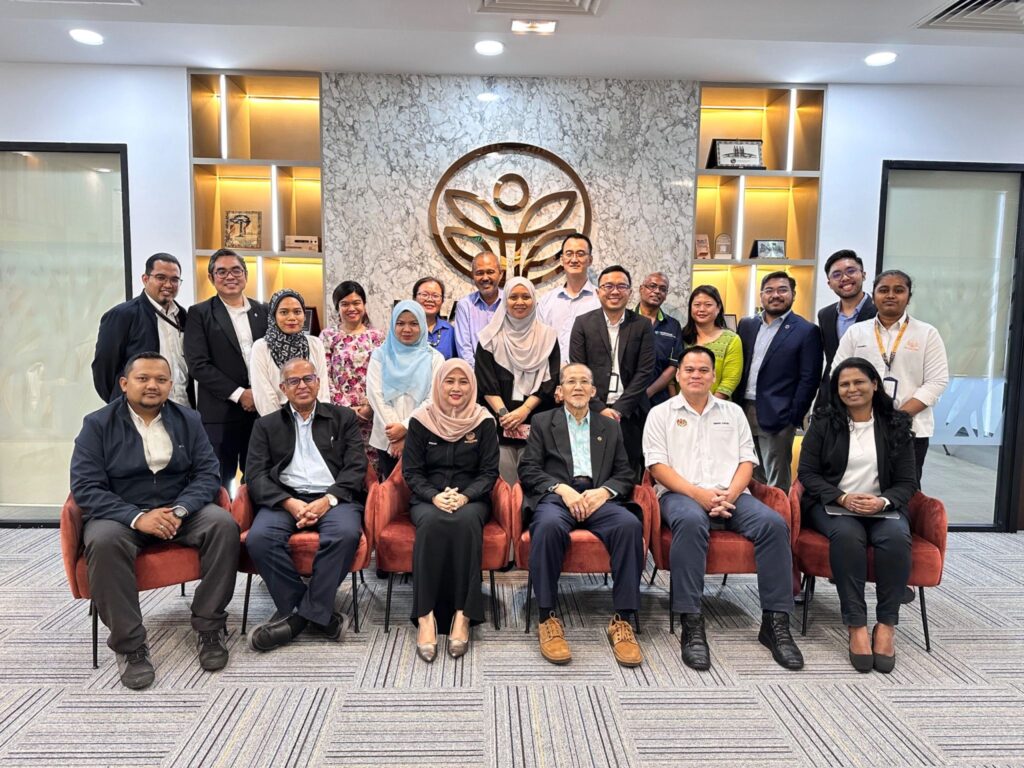
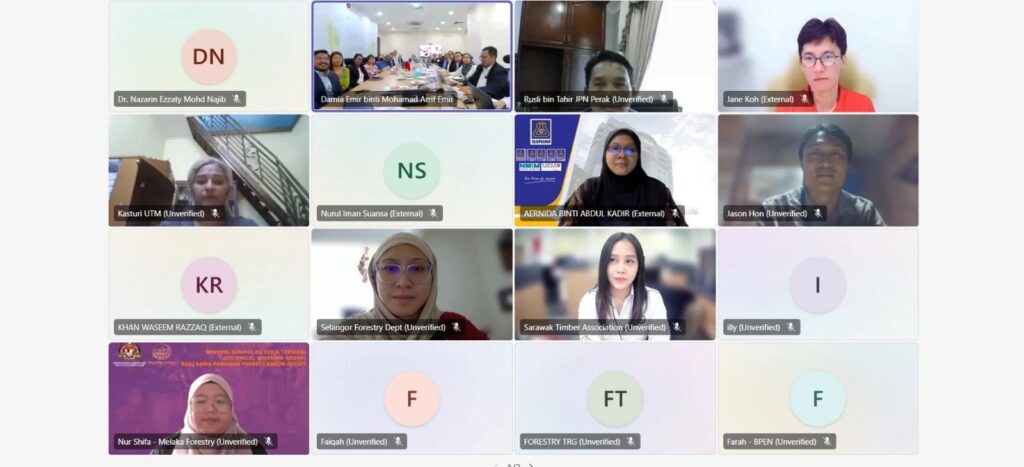
Main Guidelines for Forest Carbon Offset Program
Subsidiary Guidelines on Registration of Forest Carbon Offset Projects
Subsidiary Guidelines on Project Requirement of Forest Carbon Offset Projects
Subsidiary Guidelines on Integrity Assessment Criteria and Requirements
Subsidiary Guidelines on Certification and Issuance of Forest Carbon Offset Projects
Subsidiary Guidelines on Sustainable Goals Development and Safeguard Compliance
Subsidiary Guidelines on Validation and Verification of Forest Carbon Offset Projects
Subsidiary Guidelines on Grievance and Complaint Procedures
Subsidiary Guidelines on Registry Requirement For Registration and Tracking of Forest Carbon Units
Methodology: Afforestation, Reforestation, Restoration (ARR)
Methodology: Improved Forest Management
Methodology: Reducing Emission From Deforestation and Degradation (REDD)
Methodology: Wetland Ecosystem – Afforestation / Reforestation
Methodology: Wetland Ecosystem – Coastal Wetland Restoration
Methodology: Wetland Ecosystem – REDD and Restoration on Wetland
Methodology: Wetland Ecosystem – Rewetting and Fire Management
FCO Tools: GHG Quantification Equations
FCO Tools: Allometric Equations Guidance
FCO Tools: Buffer Calculation For Non Permanence Risks
FCO Tools: Baseline Determination and Additionality Assessment
